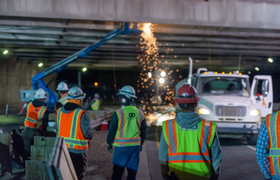By Olive Kabatwairwe, CoST Africa Regional Manager
Africa needs USD $100 billion a year for infrastructure development, but only $45 billion is being mobilized annually. Governments don’t have the capacity to deliver infrastructure investments single handedly, therefore, they need to work with the private sector. These engagements are often curtailed with fraud, bid rigging, influence peddling, bribery and collusion. Over 50% of the investments into the infrastructure sector in low-income countries, including in Africa, is lost due to corruption, mismanagement and inefficiency. Given the global challenges, reforming the way infrastructure is delivered must be central to national and regional plans, particularly by addressing inefficiency, mismanagement, and corruption in the sector.
Addressing these issues in the sector requires empowered public entities, strong processes, systems, and legal and policy frameworks that address issues of corporate accountability and financial transparency. To realize this, disclosure of owners and controllers of legal entities or arrangements that engage in delivery of public infrastructure projects is critical.
Anonymity in public procurement enables many illegal activities, such as tax evasion, corruption, money laundering, exploitation of vulnerable and special interest groups who are often used to winning public contracts out of the view of law enforcement authorities. Beneficial ownership is critical in revealing the identity of individuals who ultimately enjoy the benefits of property rights, even if they are not legal owners. Transparency about beneficial ownership is aimed to preventing companies’ owners from operating in secrecy.
Beneficial Ownership Transparency (BOT) is therefore essential to protect domestic resources mobilization, which are often channeled into political financing and increasing illicit Financial Flows (IFFs). IFFs are a huge hindrance to addressing poverty and infrastructure development in developing countries.
Building back better, with integrity, requires tackling corruption as well as putting the human rights of construction workers, affected communities and users of infrastructure at the heart of its delivery. Tackling corruption requires us to understand who benefits from infrastructure investment. CoST is looking to do this by extending its offer by looking at how we can bring greater transparency to the companies and individuals who benefit from public infrastructure contracts. It is often times worrying that the companies who are awarded the contracts are not necessarily the ones who deliver them and it can be hard to track who then ultimately receives the payments. Therefore, the conversation around who benefits from infrastructure investments is handy in open government engagements.
We discussed these issues at the “Who benefits from infrastructure investments?” session during the Africa and Middle East OGP regional meeting in November 2022. The session provided a platform for stakeholders to share experiences and way forward on implementation of BOT in the infrastructure sector.
